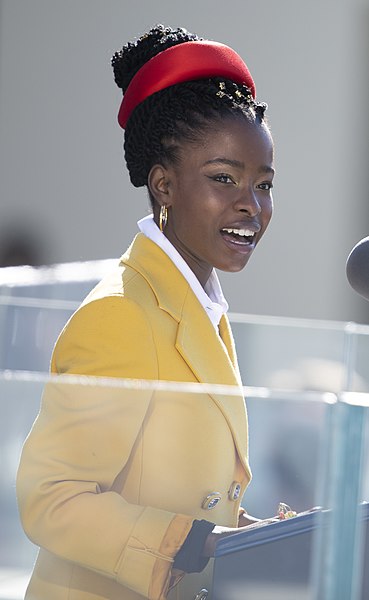Professors discuss the emergence of spoken word poetry

Recent events such as America’s Got Talent, the Presidential Inauguration and the Super Bowl have brought poetry, more especially spoken word, to a national level. Some of CRC’s English professors talk about spoken word poetry and how it can become a top-tier activity and art form.
Recent poets such as Amanda Gorman and Brandon Leake have brought spoken word poetry back to life and into the public scope as of recently, surfacing around the topics of social justice, motivation and appreciation.
English Professors Constance Carter, Heather Hutcheson, Miranda Saake and Emmanuel Sigauke discussed their thoughts on spoken word poetry reaching a national level and how the younger generations can use poetry as a top-tier art form.
“I think it’s a wonderful development for poetry,” said Carter. “The resurgence of interest in spoken word poetry has made poetry have much more broad popularity, and that’s great because poetry is such an important art form, such that all of our important moments as a nation and as a culture are commemorated in poetry.”
Carter said she gives credit to what is currently going on in the world for how much spoken word poetry has moved people in a certain way.
“Spoken word performers like Brandon Leake and Amanda Gorman are usually responding to current events, very much like early rap artists such as Public Enemy and Grandmaster Flash,” said Carter. “They were socially conscious rappers, and so that came through their lyrics, and a lot of spoken word performers are responding to what’s going on around them.”
Having someone like Amanda Gorman, a part of the younger generation, is crucial for popularizing the craft of spoken word, Hutcheson said.
“I think it (spoken word) has always been here,” said Hutcheson. “I just think that we have a cool young face doing it in Gorman, so people are hearing it.”
In order for poets to become more mainstream, it is important they have an appropriate, well-known platform where their work can be shared and understood, Hutcheson said.
“I think accessibility to the public is really important for a poet to be able to achieve that kind of rockstar status,” said Hutcheson. “People have an automatic thought that they’re not going to understand, and I think sometimes if a poem isn’t immediately accessible, people get blocked.”
Saake, like Hutcheson, also talked about accessibility with poetry and how it can be a great way to engage human feelings and experiences.
“Sometimes when we read books they feel big, and I think what poetry is supposed to do is be accessible and to feel human,” said Saake. “I feel like poetry is a human experience, and I think that is why people are responding.”
Saake said poetry has a way of connecting with any person, and down the road, different poets will be able to touch on various parts of the human experience.
“I think the really beautiful thing right now is that the world is completely cracking open, and a lot of the fractures that we rely on don’t fit anymore, and they certainly don’t fit for young people,” said Saake. “I think there will be lots of poets in lots of different places and bodies that speak to lots of different people.”
Sigauke said he is familiar with all walks of poetry and talked about how heavily publicized events, such as the Inauguration Day and the Super Bowl, have put spoken word poetry into the spotlight.
“Having poets being asked to perform at such events is just raising the profile for spoken word and also as a seriously considered genre,” said Sigauke.
Sigauke said one of the critical components for spoken word poetry to become a top-tier activity is the ability to make it a career and not just a hobby.
“Poets have to be able to be bold enough, especially young poets, to ask for payment,” said Sigauke
Some of the professors made it a point to shout out the local spoken word poetry in the Sacramento area, with many of them temporarily shut out due to the pandemic.
“Sacramento has a very vibrant poetry scene when there isn’t a pandemic,” said Hutcheson. “That is something I would do with students at least once a semester is meet them out at a public venue and hear their spoken word performed, and to make what’s on the page come alive.”
Sigauke said he works at The Sacramento Poetry Center and is hosting a spoken word event on March 29. The event will be through Zoom and Sigauke expects an audience from across the United States, and possibly from other countries such as the United Kingdom and Canada.
“This is the time for writers to dive into their craft, and that is what the world needs,” said Saake. “We need people that aren’t afraid to look at the world and interpret it.”

Len Germinara • Feb 18, 2021 at 2:58 pm
From the headline this story drew me in. I appreciate the way this story evolved. Having grown up with a love of newspapers this had that kind of involvement from the reporter. Yes, I’m one of those old folks that miss journalism and this piece brought back fond memories.
As for Spoken Word the Greeks had Rhapsodes and I bet the practice goes back further. I’ve heard it said This is the age of free verse, I believe it always has been. Reciting Homer or you, it’s history and elemental. The first poem I ever took notice of was Frost reading at JFK’s inauguration (on tv) from memory. His eyes made contact with a generation’s eyes, my eyes. A powerful thing that. Write on.
len germinara
http://www.lengerminara.com